University Case Study: International Trade and Finance (BUS708)
VerifiedAdded on 2023/04/21
|12
|3279
|171
Case Study
AI Summary
This case study examines the Transatlantic Trade and Investment Partnership (TTIP), a proposed free trade agreement between the United States and the European Union. It analyzes the potential benefits of TTIP, such as increased economic growth, job creation, and reduced trade tariffs, particularl...
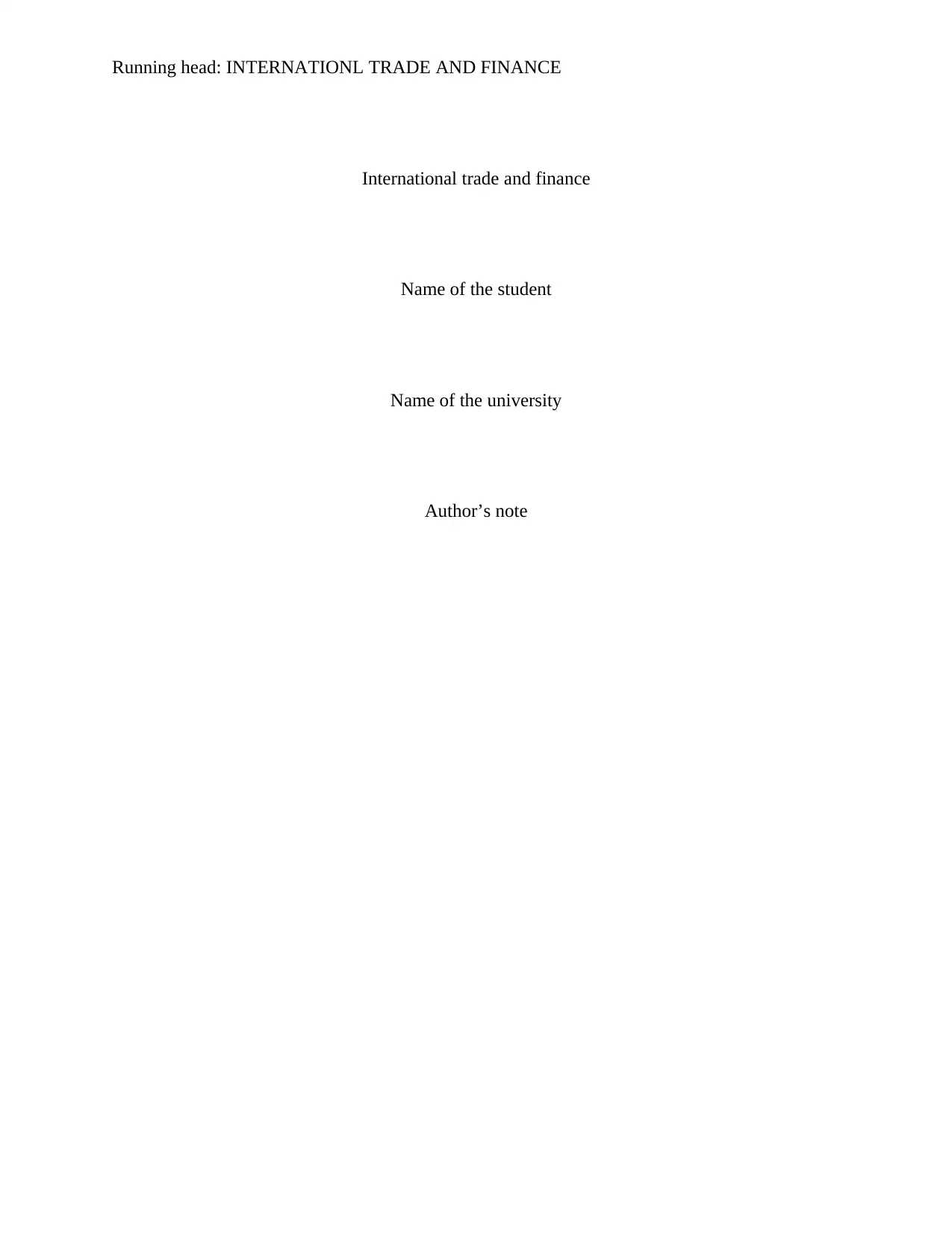
Running head: INTERNATIONL TRADE AND FINANCE
International trade and finance
Name of the student
Name of the university
Author’s note
International trade and finance
Name of the student
Name of the university
Author’s note
Paraphrase This Document
Need a fresh take? Get an instant paraphrase of this document with our AI Paraphraser
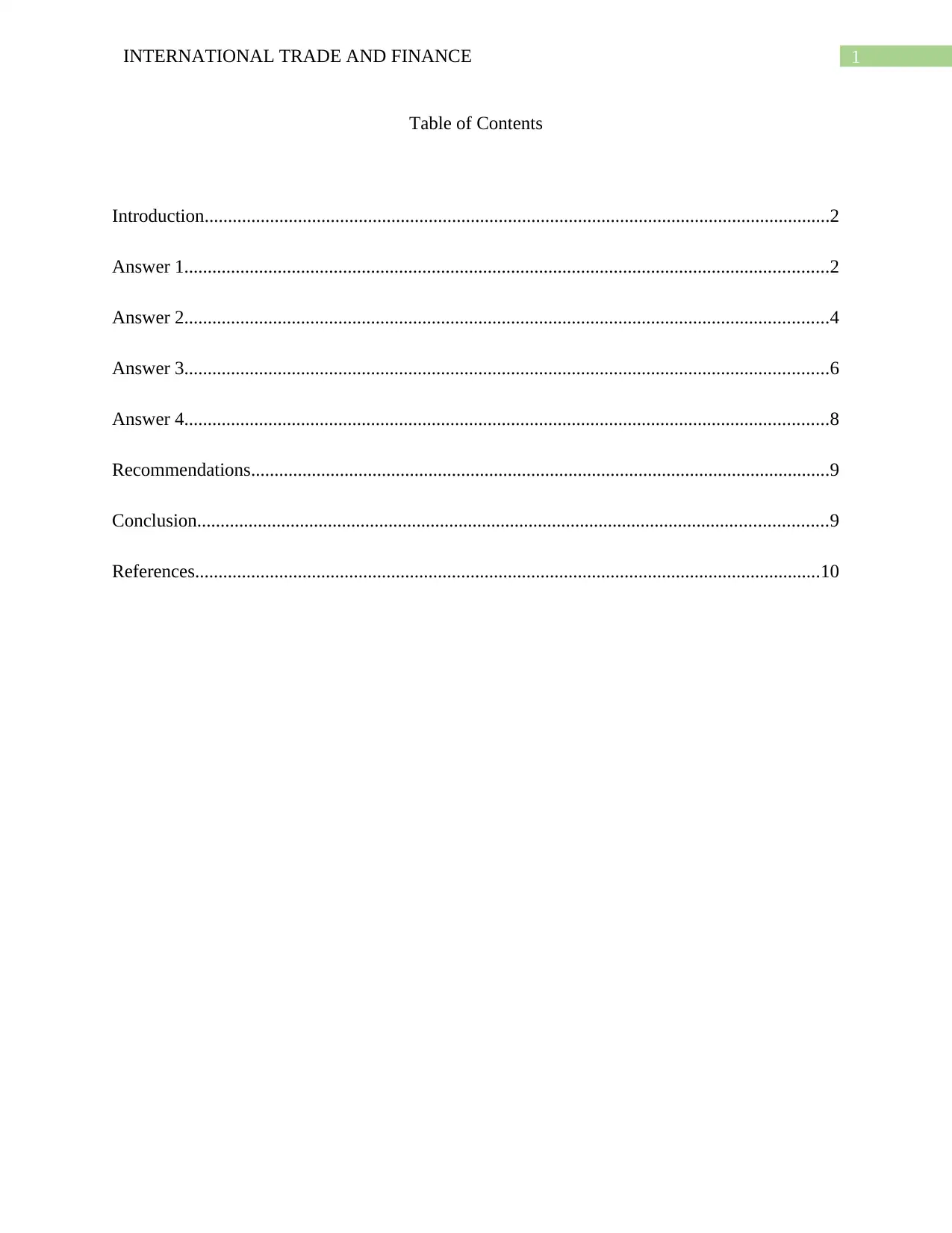
1INTERNATIONAL TRADE AND FINANCE
Table of Contents
Introduction......................................................................................................................................2
Answer 1..........................................................................................................................................2
Answer 2..........................................................................................................................................4
Answer 3..........................................................................................................................................6
Answer 4..........................................................................................................................................8
Recommendations............................................................................................................................9
Conclusion.......................................................................................................................................9
References......................................................................................................................................10
Table of Contents
Introduction......................................................................................................................................2
Answer 1..........................................................................................................................................2
Answer 2..........................................................................................................................................4
Answer 3..........................................................................................................................................6
Answer 4..........................................................................................................................................8
Recommendations............................................................................................................................9
Conclusion.......................................................................................................................................9
References......................................................................................................................................10
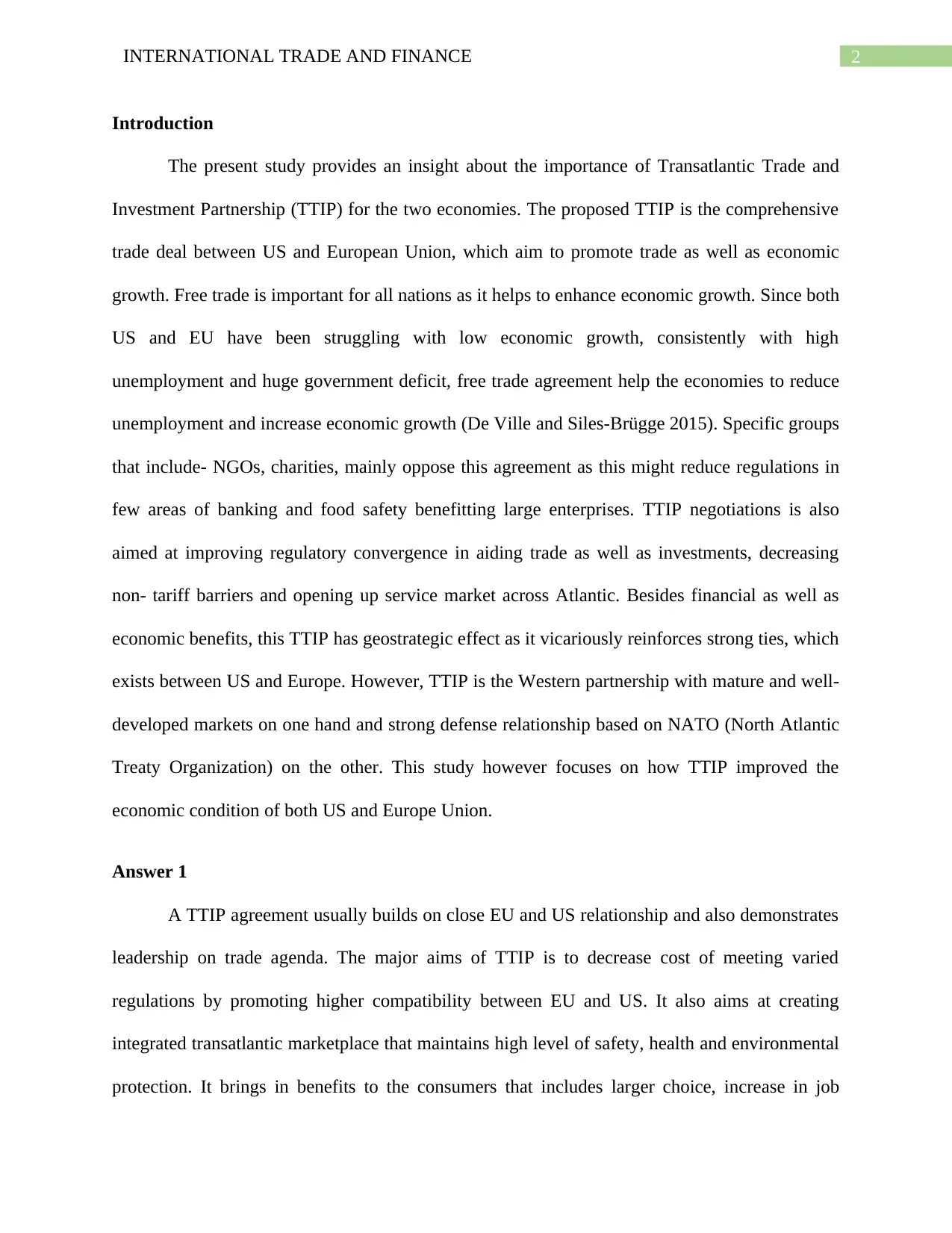
2INTERNATIONAL TRADE AND FINANCE
Introduction
The present study provides an insight about the importance of Transatlantic Trade and
Investment Partnership (TTIP) for the two economies. The proposed TTIP is the comprehensive
trade deal between US and European Union, which aim to promote trade as well as economic
growth. Free trade is important for all nations as it helps to enhance economic growth. Since both
US and EU have been struggling with low economic growth, consistently with high
unemployment and huge government deficit, free trade agreement help the economies to reduce
unemployment and increase economic growth (De Ville and Siles-Brügge 2015). Specific groups
that include- NGOs, charities, mainly oppose this agreement as this might reduce regulations in
few areas of banking and food safety benefitting large enterprises. TTIP negotiations is also
aimed at improving regulatory convergence in aiding trade as well as investments, decreasing
non- tariff barriers and opening up service market across Atlantic. Besides financial as well as
economic benefits, this TTIP has geostrategic effect as it vicariously reinforces strong ties, which
exists between US and Europe. However, TTIP is the Western partnership with mature and well-
developed markets on one hand and strong defense relationship based on NATO (North Atlantic
Treaty Organization) on the other. This study however focuses on how TTIP improved the
economic condition of both US and Europe Union.
Answer 1
A TTIP agreement usually builds on close EU and US relationship and also demonstrates
leadership on trade agenda. The major aims of TTIP is to decrease cost of meeting varied
regulations by promoting higher compatibility between EU and US. It also aims at creating
integrated transatlantic marketplace that maintains high level of safety, health and environmental
protection. It brings in benefits to the consumers that includes larger choice, increase in job
Introduction
The present study provides an insight about the importance of Transatlantic Trade and
Investment Partnership (TTIP) for the two economies. The proposed TTIP is the comprehensive
trade deal between US and European Union, which aim to promote trade as well as economic
growth. Free trade is important for all nations as it helps to enhance economic growth. Since both
US and EU have been struggling with low economic growth, consistently with high
unemployment and huge government deficit, free trade agreement help the economies to reduce
unemployment and increase economic growth (De Ville and Siles-Brügge 2015). Specific groups
that include- NGOs, charities, mainly oppose this agreement as this might reduce regulations in
few areas of banking and food safety benefitting large enterprises. TTIP negotiations is also
aimed at improving regulatory convergence in aiding trade as well as investments, decreasing
non- tariff barriers and opening up service market across Atlantic. Besides financial as well as
economic benefits, this TTIP has geostrategic effect as it vicariously reinforces strong ties, which
exists between US and Europe. However, TTIP is the Western partnership with mature and well-
developed markets on one hand and strong defense relationship based on NATO (North Atlantic
Treaty Organization) on the other. This study however focuses on how TTIP improved the
economic condition of both US and Europe Union.
Answer 1
A TTIP agreement usually builds on close EU and US relationship and also demonstrates
leadership on trade agenda. The major aims of TTIP is to decrease cost of meeting varied
regulations by promoting higher compatibility between EU and US. It also aims at creating
integrated transatlantic marketplace that maintains high level of safety, health and environmental
protection. It brings in benefits to the consumers that includes larger choice, increase in job
⊘ This is a preview!⊘
Do you want full access?
Subscribe today to unlock all pages.

Trusted by 1+ million students worldwide
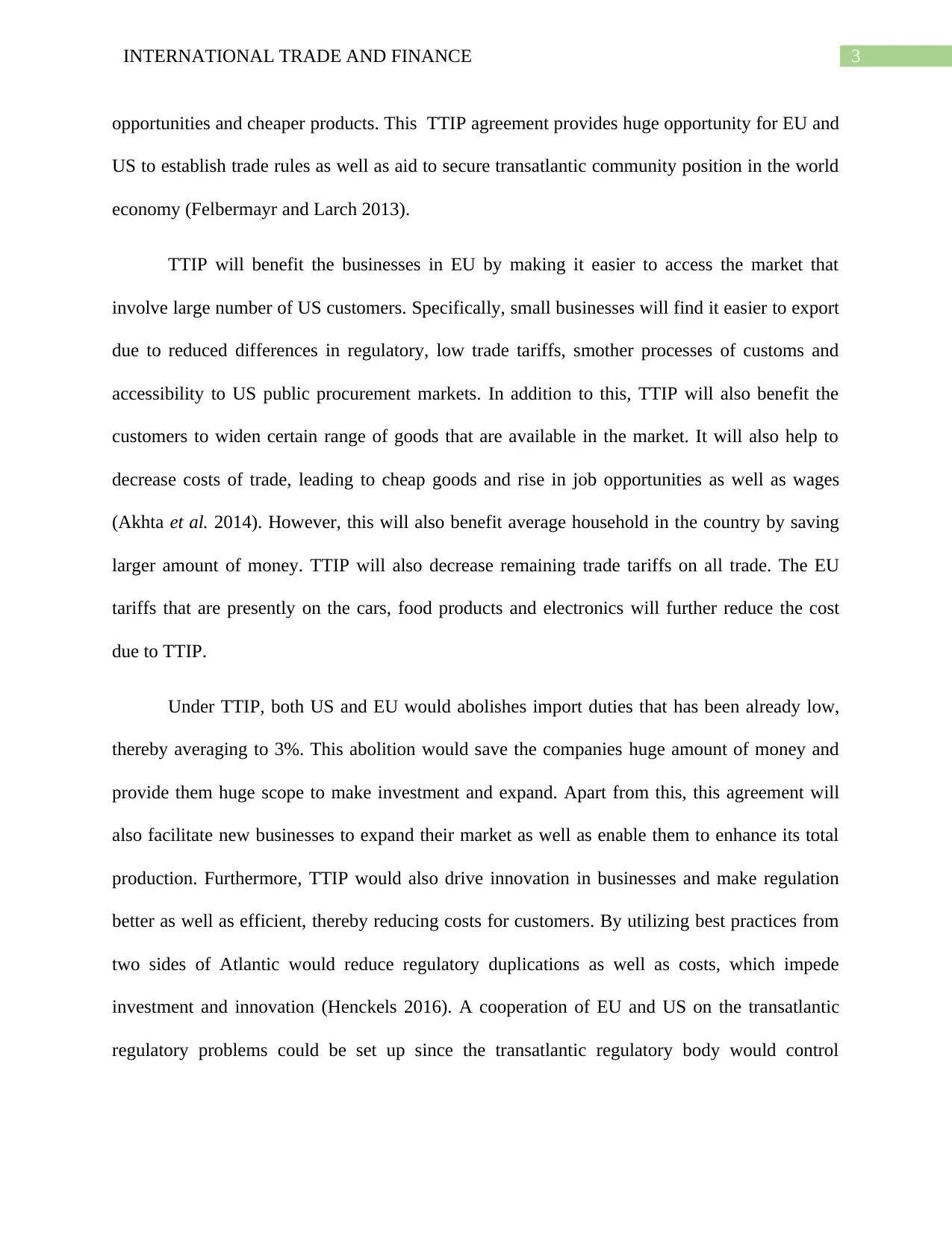
3INTERNATIONAL TRADE AND FINANCE
opportunities and cheaper products. This TTIP agreement provides huge opportunity for EU and
US to establish trade rules as well as aid to secure transatlantic community position in the world
economy (Felbermayr and Larch 2013).
TTIP will benefit the businesses in EU by making it easier to access the market that
involve large number of US customers. Specifically, small businesses will find it easier to export
due to reduced differences in regulatory, low trade tariffs, smother processes of customs and
accessibility to US public procurement markets. In addition to this, TTIP will also benefit the
customers to widen certain range of goods that are available in the market. It will also help to
decrease costs of trade, leading to cheap goods and rise in job opportunities as well as wages
(Akhta et al. 2014). However, this will also benefit average household in the country by saving
larger amount of money. TTIP will also decrease remaining trade tariffs on all trade. The EU
tariffs that are presently on the cars, food products and electronics will further reduce the cost
due to TTIP.
Under TTIP, both US and EU would abolishes import duties that has been already low,
thereby averaging to 3%. This abolition would save the companies huge amount of money and
provide them huge scope to make investment and expand. Apart from this, this agreement will
also facilitate new businesses to expand their market as well as enable them to enhance its total
production. Furthermore, TTIP would also drive innovation in businesses and make regulation
better as well as efficient, thereby reducing costs for customers. By utilizing best practices from
two sides of Atlantic would reduce regulatory duplications as well as costs, which impede
investment and innovation (Henckels 2016). A cooperation of EU and US on the transatlantic
regulatory problems could be set up since the transatlantic regulatory body would control
opportunities and cheaper products. This TTIP agreement provides huge opportunity for EU and
US to establish trade rules as well as aid to secure transatlantic community position in the world
economy (Felbermayr and Larch 2013).
TTIP will benefit the businesses in EU by making it easier to access the market that
involve large number of US customers. Specifically, small businesses will find it easier to export
due to reduced differences in regulatory, low trade tariffs, smother processes of customs and
accessibility to US public procurement markets. In addition to this, TTIP will also benefit the
customers to widen certain range of goods that are available in the market. It will also help to
decrease costs of trade, leading to cheap goods and rise in job opportunities as well as wages
(Akhta et al. 2014). However, this will also benefit average household in the country by saving
larger amount of money. TTIP will also decrease remaining trade tariffs on all trade. The EU
tariffs that are presently on the cars, food products and electronics will further reduce the cost
due to TTIP.
Under TTIP, both US and EU would abolishes import duties that has been already low,
thereby averaging to 3%. This abolition would save the companies huge amount of money and
provide them huge scope to make investment and expand. Apart from this, this agreement will
also facilitate new businesses to expand their market as well as enable them to enhance its total
production. Furthermore, TTIP would also drive innovation in businesses and make regulation
better as well as efficient, thereby reducing costs for customers. By utilizing best practices from
two sides of Atlantic would reduce regulatory duplications as well as costs, which impede
investment and innovation (Henckels 2016). A cooperation of EU and US on the transatlantic
regulatory problems could be set up since the transatlantic regulatory body would control
Paraphrase This Document
Need a fresh take? Get an instant paraphrase of this document with our AI Paraphraser
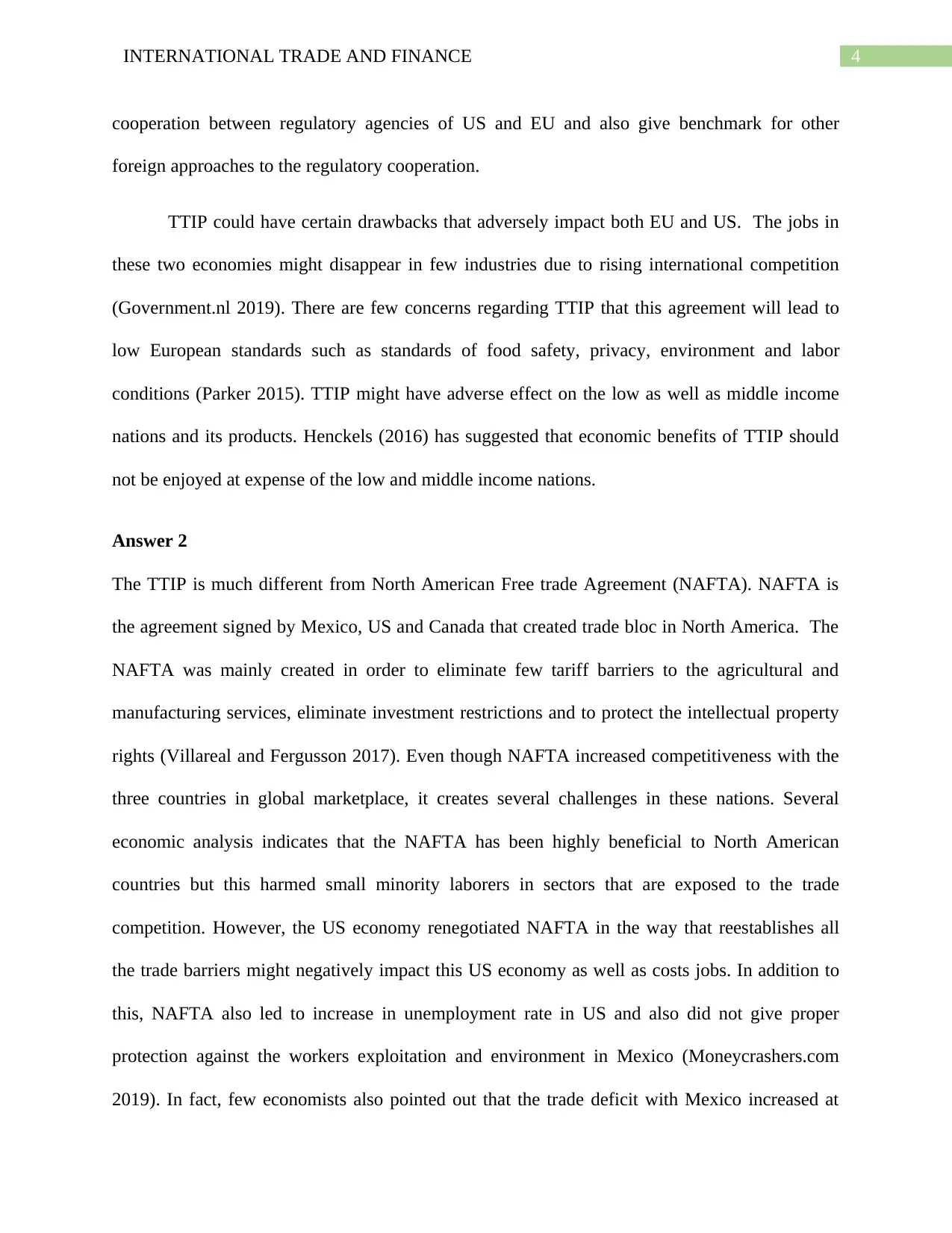
4INTERNATIONAL TRADE AND FINANCE
cooperation between regulatory agencies of US and EU and also give benchmark for other
foreign approaches to the regulatory cooperation.
TTIP could have certain drawbacks that adversely impact both EU and US. The jobs in
these two economies might disappear in few industries due to rising international competition
(Government.nl 2019). There are few concerns regarding TTIP that this agreement will lead to
low European standards such as standards of food safety, privacy, environment and labor
conditions (Parker 2015). TTIP might have adverse effect on the low as well as middle income
nations and its products. Henckels (2016) has suggested that economic benefits of TTIP should
not be enjoyed at expense of the low and middle income nations.
Answer 2
The TTIP is much different from North American Free trade Agreement (NAFTA). NAFTA is
the agreement signed by Mexico, US and Canada that created trade bloc in North America. The
NAFTA was mainly created in order to eliminate few tariff barriers to the agricultural and
manufacturing services, eliminate investment restrictions and to protect the intellectual property
rights (Villareal and Fergusson 2017). Even though NAFTA increased competitiveness with the
three countries in global marketplace, it creates several challenges in these nations. Several
economic analysis indicates that the NAFTA has been highly beneficial to North American
countries but this harmed small minority laborers in sectors that are exposed to the trade
competition. However, the US economy renegotiated NAFTA in the way that reestablishes all
the trade barriers might negatively impact this US economy as well as costs jobs. In addition to
this, NAFTA also led to increase in unemployment rate in US and also did not give proper
protection against the workers exploitation and environment in Mexico (Moneycrashers.com
2019). In fact, few economists also pointed out that the trade deficit with Mexico increased at
cooperation between regulatory agencies of US and EU and also give benchmark for other
foreign approaches to the regulatory cooperation.
TTIP could have certain drawbacks that adversely impact both EU and US. The jobs in
these two economies might disappear in few industries due to rising international competition
(Government.nl 2019). There are few concerns regarding TTIP that this agreement will lead to
low European standards such as standards of food safety, privacy, environment and labor
conditions (Parker 2015). TTIP might have adverse effect on the low as well as middle income
nations and its products. Henckels (2016) has suggested that economic benefits of TTIP should
not be enjoyed at expense of the low and middle income nations.
Answer 2
The TTIP is much different from North American Free trade Agreement (NAFTA). NAFTA is
the agreement signed by Mexico, US and Canada that created trade bloc in North America. The
NAFTA was mainly created in order to eliminate few tariff barriers to the agricultural and
manufacturing services, eliminate investment restrictions and to protect the intellectual property
rights (Villareal and Fergusson 2017). Even though NAFTA increased competitiveness with the
three countries in global marketplace, it creates several challenges in these nations. Several
economic analysis indicates that the NAFTA has been highly beneficial to North American
countries but this harmed small minority laborers in sectors that are exposed to the trade
competition. However, the US economy renegotiated NAFTA in the way that reestablishes all
the trade barriers might negatively impact this US economy as well as costs jobs. In addition to
this, NAFTA also led to increase in unemployment rate in US and also did not give proper
protection against the workers exploitation and environment in Mexico (Moneycrashers.com
2019). In fact, few economists also pointed out that the trade deficit with Mexico increased at
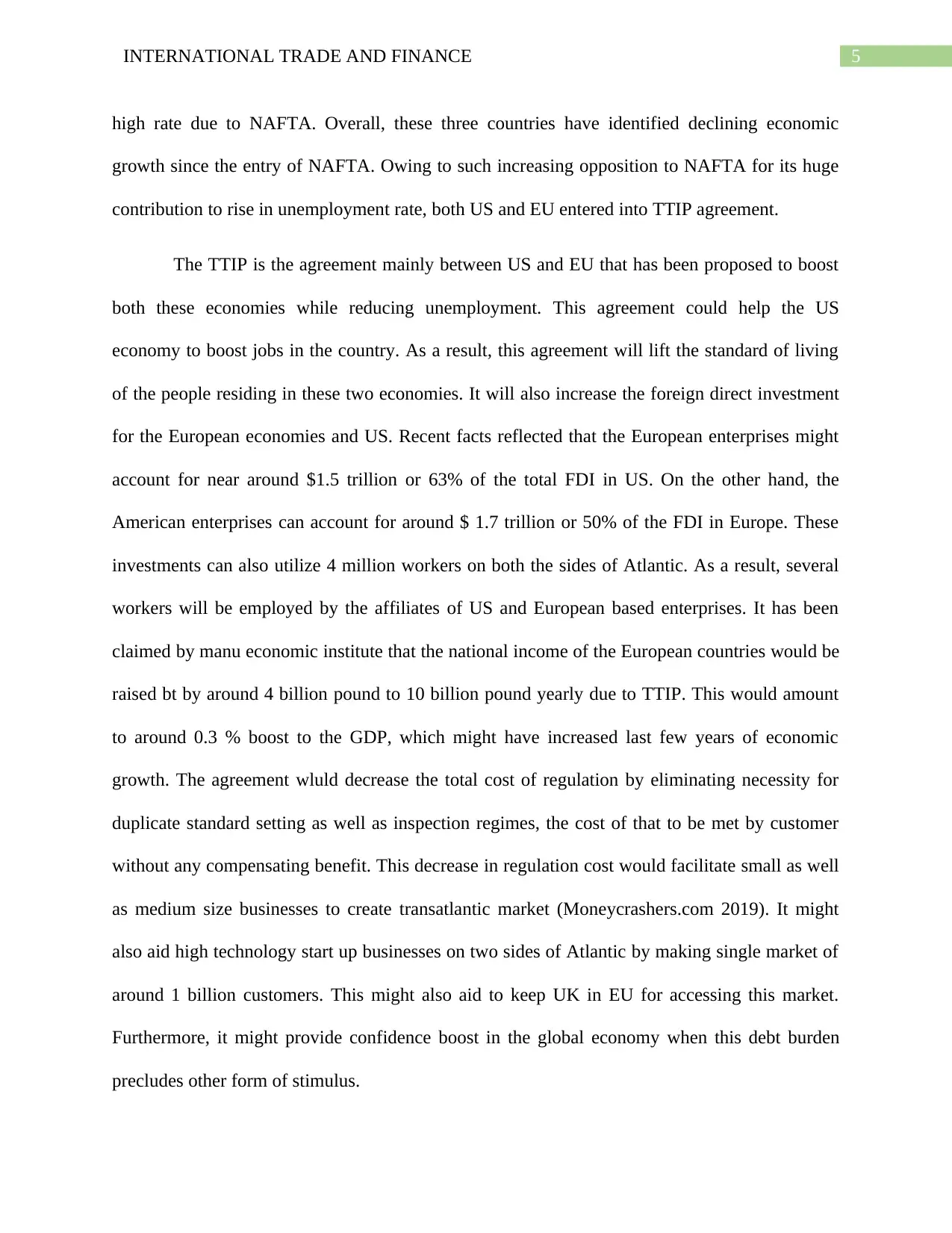
5INTERNATIONAL TRADE AND FINANCE
high rate due to NAFTA. Overall, these three countries have identified declining economic
growth since the entry of NAFTA. Owing to such increasing opposition to NAFTA for its huge
contribution to rise in unemployment rate, both US and EU entered into TTIP agreement.
The TTIP is the agreement mainly between US and EU that has been proposed to boost
both these economies while reducing unemployment. This agreement could help the US
economy to boost jobs in the country. As a result, this agreement will lift the standard of living
of the people residing in these two economies. It will also increase the foreign direct investment
for the European economies and US. Recent facts reflected that the European enterprises might
account for near around $1.5 trillion or 63% of the total FDI in US. On the other hand, the
American enterprises can account for around $ 1.7 trillion or 50% of the FDI in Europe. These
investments can also utilize 4 million workers on both the sides of Atlantic. As a result, several
workers will be employed by the affiliates of US and European based enterprises. It has been
claimed by manu economic institute that the national income of the European countries would be
raised bt by around 4 billion pound to 10 billion pound yearly due to TTIP. This would amount
to around 0.3 % boost to the GDP, which might have increased last few years of economic
growth. The agreement wluld decrease the total cost of regulation by eliminating necessity for
duplicate standard setting as well as inspection regimes, the cost of that to be met by customer
without any compensating benefit. This decrease in regulation cost would facilitate small as well
as medium size businesses to create transatlantic market (Moneycrashers.com 2019). It might
also aid high technology start up businesses on two sides of Atlantic by making single market of
around 1 billion customers. This might also aid to keep UK in EU for accessing this market.
Furthermore, it might provide confidence boost in the global economy when this debt burden
precludes other form of stimulus.
high rate due to NAFTA. Overall, these three countries have identified declining economic
growth since the entry of NAFTA. Owing to such increasing opposition to NAFTA for its huge
contribution to rise in unemployment rate, both US and EU entered into TTIP agreement.
The TTIP is the agreement mainly between US and EU that has been proposed to boost
both these economies while reducing unemployment. This agreement could help the US
economy to boost jobs in the country. As a result, this agreement will lift the standard of living
of the people residing in these two economies. It will also increase the foreign direct investment
for the European economies and US. Recent facts reflected that the European enterprises might
account for near around $1.5 trillion or 63% of the total FDI in US. On the other hand, the
American enterprises can account for around $ 1.7 trillion or 50% of the FDI in Europe. These
investments can also utilize 4 million workers on both the sides of Atlantic. As a result, several
workers will be employed by the affiliates of US and European based enterprises. It has been
claimed by manu economic institute that the national income of the European countries would be
raised bt by around 4 billion pound to 10 billion pound yearly due to TTIP. This would amount
to around 0.3 % boost to the GDP, which might have increased last few years of economic
growth. The agreement wluld decrease the total cost of regulation by eliminating necessity for
duplicate standard setting as well as inspection regimes, the cost of that to be met by customer
without any compensating benefit. This decrease in regulation cost would facilitate small as well
as medium size businesses to create transatlantic market (Moneycrashers.com 2019). It might
also aid high technology start up businesses on two sides of Atlantic by making single market of
around 1 billion customers. This might also aid to keep UK in EU for accessing this market.
Furthermore, it might provide confidence boost in the global economy when this debt burden
precludes other form of stimulus.
⊘ This is a preview!⊘
Do you want full access?
Subscribe today to unlock all pages.

Trusted by 1+ million students worldwide
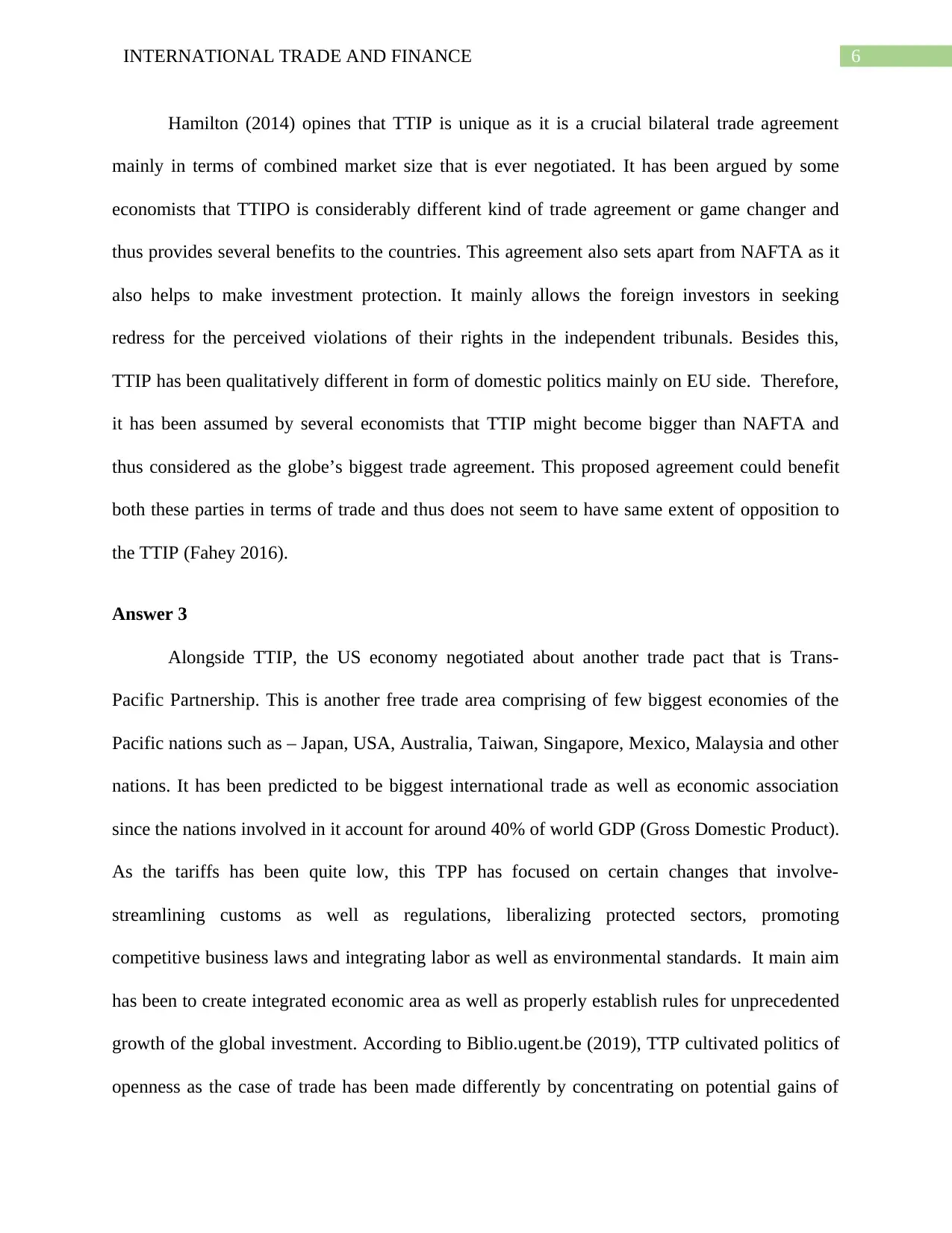
6INTERNATIONAL TRADE AND FINANCE
Hamilton (2014) opines that TTIP is unique as it is a crucial bilateral trade agreement
mainly in terms of combined market size that is ever negotiated. It has been argued by some
economists that TTIPO is considerably different kind of trade agreement or game changer and
thus provides several benefits to the countries. This agreement also sets apart from NAFTA as it
also helps to make investment protection. It mainly allows the foreign investors in seeking
redress for the perceived violations of their rights in the independent tribunals. Besides this,
TTIP has been qualitatively different in form of domestic politics mainly on EU side. Therefore,
it has been assumed by several economists that TTIP might become bigger than NAFTA and
thus considered as the globe’s biggest trade agreement. This proposed agreement could benefit
both these parties in terms of trade and thus does not seem to have same extent of opposition to
the TTIP (Fahey 2016).
Answer 3
Alongside TTIP, the US economy negotiated about another trade pact that is Trans-
Pacific Partnership. This is another free trade area comprising of few biggest economies of the
Pacific nations such as – Japan, USA, Australia, Taiwan, Singapore, Mexico, Malaysia and other
nations. It has been predicted to be biggest international trade as well as economic association
since the nations involved in it account for around 40% of world GDP (Gross Domestic Product).
As the tariffs has been quite low, this TPP has focused on certain changes that involve-
streamlining customs as well as regulations, liberalizing protected sectors, promoting
competitive business laws and integrating labor as well as environmental standards. It main aim
has been to create integrated economic area as well as properly establish rules for unprecedented
growth of the global investment. According to Biblio.ugent.be (2019), TTP cultivated politics of
openness as the case of trade has been made differently by concentrating on potential gains of
Hamilton (2014) opines that TTIP is unique as it is a crucial bilateral trade agreement
mainly in terms of combined market size that is ever negotiated. It has been argued by some
economists that TTIPO is considerably different kind of trade agreement or game changer and
thus provides several benefits to the countries. This agreement also sets apart from NAFTA as it
also helps to make investment protection. It mainly allows the foreign investors in seeking
redress for the perceived violations of their rights in the independent tribunals. Besides this,
TTIP has been qualitatively different in form of domestic politics mainly on EU side. Therefore,
it has been assumed by several economists that TTIP might become bigger than NAFTA and
thus considered as the globe’s biggest trade agreement. This proposed agreement could benefit
both these parties in terms of trade and thus does not seem to have same extent of opposition to
the TTIP (Fahey 2016).
Answer 3
Alongside TTIP, the US economy negotiated about another trade pact that is Trans-
Pacific Partnership. This is another free trade area comprising of few biggest economies of the
Pacific nations such as – Japan, USA, Australia, Taiwan, Singapore, Mexico, Malaysia and other
nations. It has been predicted to be biggest international trade as well as economic association
since the nations involved in it account for around 40% of world GDP (Gross Domestic Product).
As the tariffs has been quite low, this TPP has focused on certain changes that involve-
streamlining customs as well as regulations, liberalizing protected sectors, promoting
competitive business laws and integrating labor as well as environmental standards. It main aim
has been to create integrated economic area as well as properly establish rules for unprecedented
growth of the global investment. According to Biblio.ugent.be (2019), TTP cultivated politics of
openness as the case of trade has been made differently by concentrating on potential gains of
Paraphrase This Document
Need a fresh take? Get an instant paraphrase of this document with our AI Paraphraser
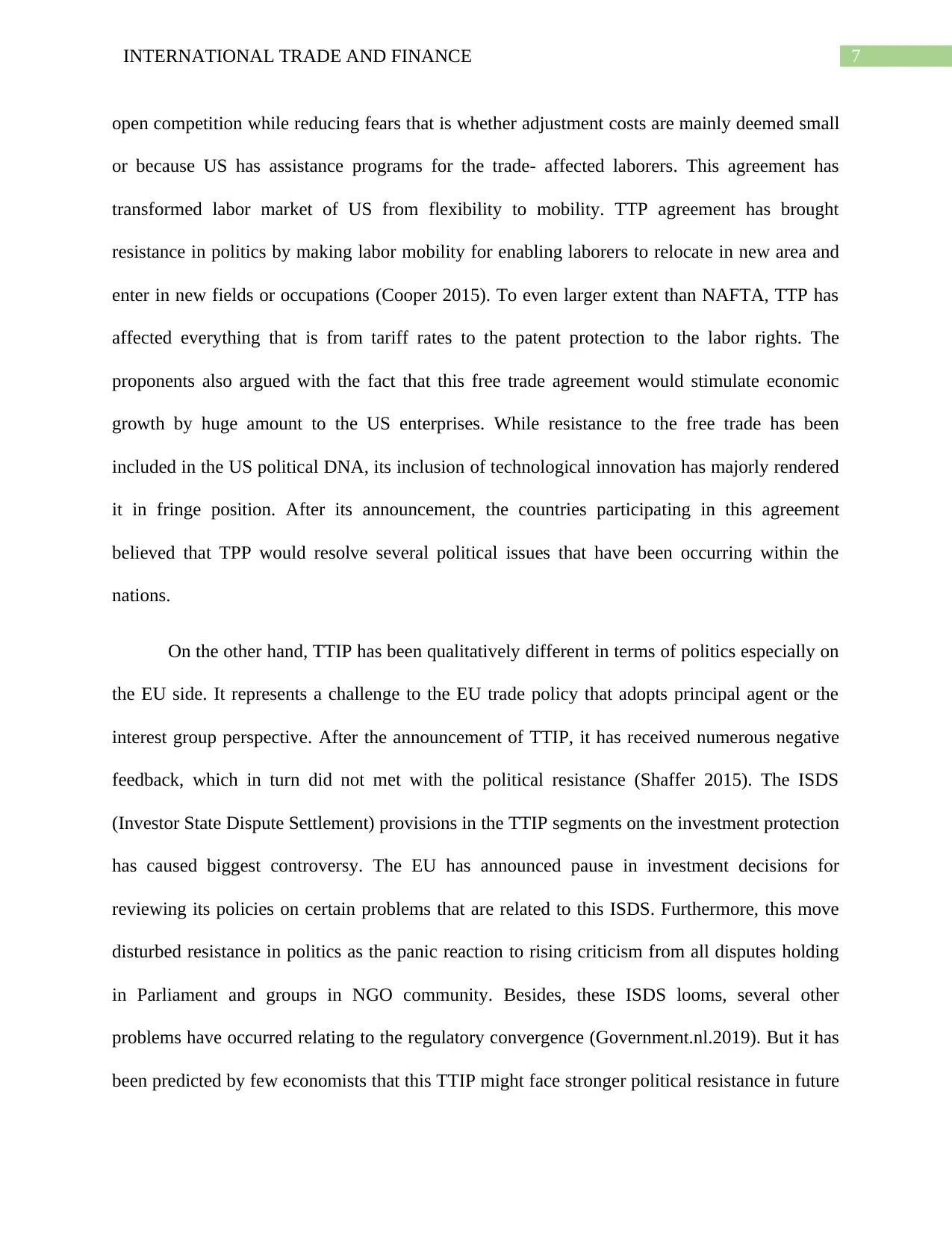
7INTERNATIONAL TRADE AND FINANCE
open competition while reducing fears that is whether adjustment costs are mainly deemed small
or because US has assistance programs for the trade- affected laborers. This agreement has
transformed labor market of US from flexibility to mobility. TTP agreement has brought
resistance in politics by making labor mobility for enabling laborers to relocate in new area and
enter in new fields or occupations (Cooper 2015). To even larger extent than NAFTA, TTP has
affected everything that is from tariff rates to the patent protection to the labor rights. The
proponents also argued with the fact that this free trade agreement would stimulate economic
growth by huge amount to the US enterprises. While resistance to the free trade has been
included in the US political DNA, its inclusion of technological innovation has majorly rendered
it in fringe position. After its announcement, the countries participating in this agreement
believed that TPP would resolve several political issues that have been occurring within the
nations.
On the other hand, TTIP has been qualitatively different in terms of politics especially on
the EU side. It represents a challenge to the EU trade policy that adopts principal agent or the
interest group perspective. After the announcement of TTIP, it has received numerous negative
feedback, which in turn did not met with the political resistance (Shaffer 2015). The ISDS
(Investor State Dispute Settlement) provisions in the TTIP segments on the investment protection
has caused biggest controversy. The EU has announced pause in investment decisions for
reviewing its policies on certain problems that are related to this ISDS. Furthermore, this move
disturbed resistance in politics as the panic reaction to rising criticism from all disputes holding
in Parliament and groups in NGO community. Besides, these ISDS looms, several other
problems have occurred relating to the regulatory convergence (Government.nl.2019). But it has
been predicted by few economists that this TTIP might face stronger political resistance in future
open competition while reducing fears that is whether adjustment costs are mainly deemed small
or because US has assistance programs for the trade- affected laborers. This agreement has
transformed labor market of US from flexibility to mobility. TTP agreement has brought
resistance in politics by making labor mobility for enabling laborers to relocate in new area and
enter in new fields or occupations (Cooper 2015). To even larger extent than NAFTA, TTP has
affected everything that is from tariff rates to the patent protection to the labor rights. The
proponents also argued with the fact that this free trade agreement would stimulate economic
growth by huge amount to the US enterprises. While resistance to the free trade has been
included in the US political DNA, its inclusion of technological innovation has majorly rendered
it in fringe position. After its announcement, the countries participating in this agreement
believed that TPP would resolve several political issues that have been occurring within the
nations.
On the other hand, TTIP has been qualitatively different in terms of politics especially on
the EU side. It represents a challenge to the EU trade policy that adopts principal agent or the
interest group perspective. After the announcement of TTIP, it has received numerous negative
feedback, which in turn did not met with the political resistance (Shaffer 2015). The ISDS
(Investor State Dispute Settlement) provisions in the TTIP segments on the investment protection
has caused biggest controversy. The EU has announced pause in investment decisions for
reviewing its policies on certain problems that are related to this ISDS. Furthermore, this move
disturbed resistance in politics as the panic reaction to rising criticism from all disputes holding
in Parliament and groups in NGO community. Besides, these ISDS looms, several other
problems have occurred relating to the regulatory convergence (Government.nl.2019). But it has
been predicted by few economists that this TTIP might face stronger political resistance in future
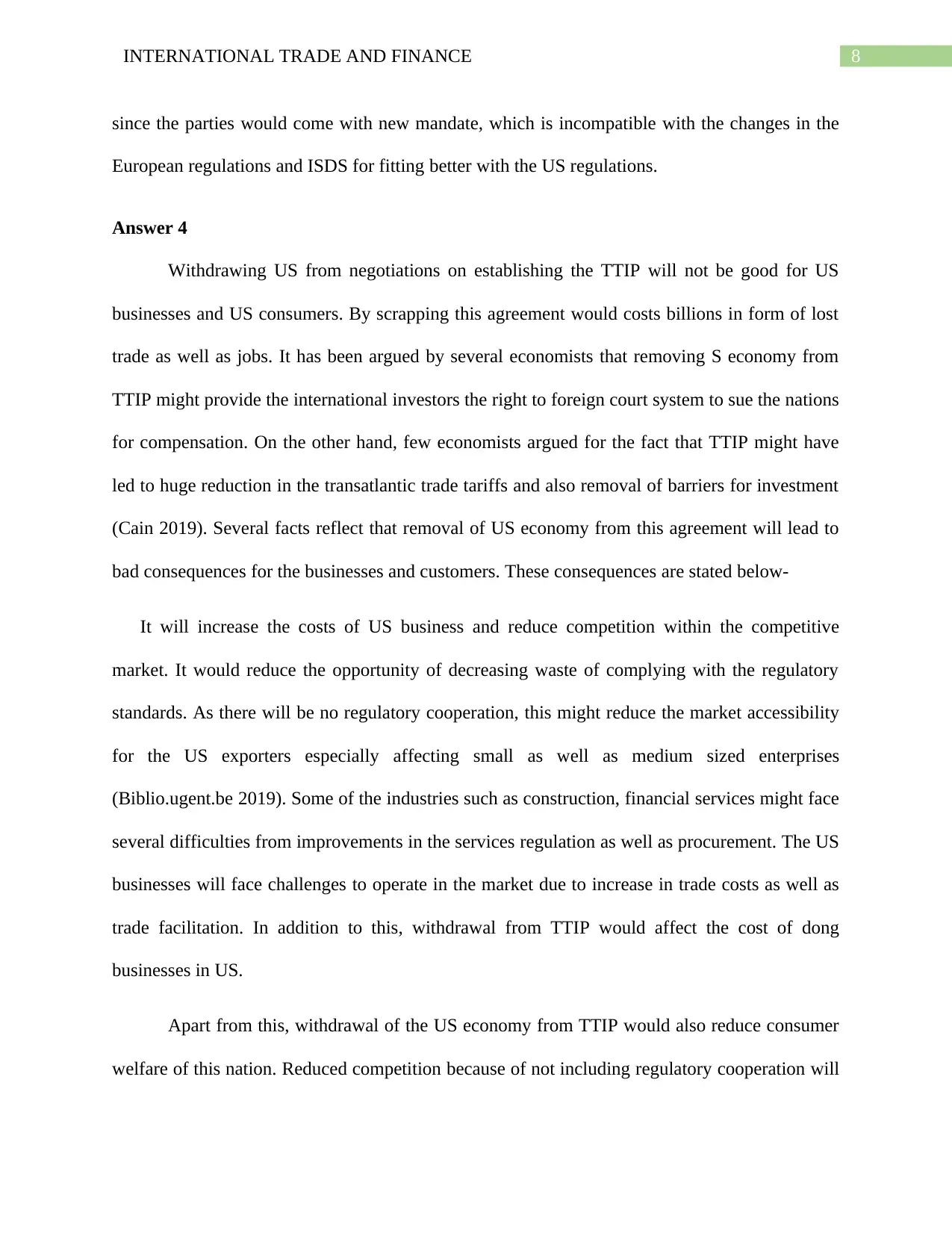
8INTERNATIONAL TRADE AND FINANCE
since the parties would come with new mandate, which is incompatible with the changes in the
European regulations and ISDS for fitting better with the US regulations.
Answer 4
Withdrawing US from negotiations on establishing the TTIP will not be good for US
businesses and US consumers. By scrapping this agreement would costs billions in form of lost
trade as well as jobs. It has been argued by several economists that removing S economy from
TTIP might provide the international investors the right to foreign court system to sue the nations
for compensation. On the other hand, few economists argued for the fact that TTIP might have
led to huge reduction in the transatlantic trade tariffs and also removal of barriers for investment
(Cain 2019). Several facts reflect that removal of US economy from this agreement will lead to
bad consequences for the businesses and customers. These consequences are stated below-
It will increase the costs of US business and reduce competition within the competitive
market. It would reduce the opportunity of decreasing waste of complying with the regulatory
standards. As there will be no regulatory cooperation, this might reduce the market accessibility
for the US exporters especially affecting small as well as medium sized enterprises
(Biblio.ugent.be 2019). Some of the industries such as construction, financial services might face
several difficulties from improvements in the services regulation as well as procurement. The US
businesses will face challenges to operate in the market due to increase in trade costs as well as
trade facilitation. In addition to this, withdrawal from TTIP would affect the cost of dong
businesses in US.
Apart from this, withdrawal of the US economy from TTIP would also reduce consumer
welfare of this nation. Reduced competition because of not including regulatory cooperation will
since the parties would come with new mandate, which is incompatible with the changes in the
European regulations and ISDS for fitting better with the US regulations.
Answer 4
Withdrawing US from negotiations on establishing the TTIP will not be good for US
businesses and US consumers. By scrapping this agreement would costs billions in form of lost
trade as well as jobs. It has been argued by several economists that removing S economy from
TTIP might provide the international investors the right to foreign court system to sue the nations
for compensation. On the other hand, few economists argued for the fact that TTIP might have
led to huge reduction in the transatlantic trade tariffs and also removal of barriers for investment
(Cain 2019). Several facts reflect that removal of US economy from this agreement will lead to
bad consequences for the businesses and customers. These consequences are stated below-
It will increase the costs of US business and reduce competition within the competitive
market. It would reduce the opportunity of decreasing waste of complying with the regulatory
standards. As there will be no regulatory cooperation, this might reduce the market accessibility
for the US exporters especially affecting small as well as medium sized enterprises
(Biblio.ugent.be 2019). Some of the industries such as construction, financial services might face
several difficulties from improvements in the services regulation as well as procurement. The US
businesses will face challenges to operate in the market due to increase in trade costs as well as
trade facilitation. In addition to this, withdrawal from TTIP would affect the cost of dong
businesses in US.
Apart from this, withdrawal of the US economy from TTIP would also reduce consumer
welfare of this nation. Reduced competition because of not including regulatory cooperation will
⊘ This is a preview!⊘
Do you want full access?
Subscribe today to unlock all pages.

Trusted by 1+ million students worldwide
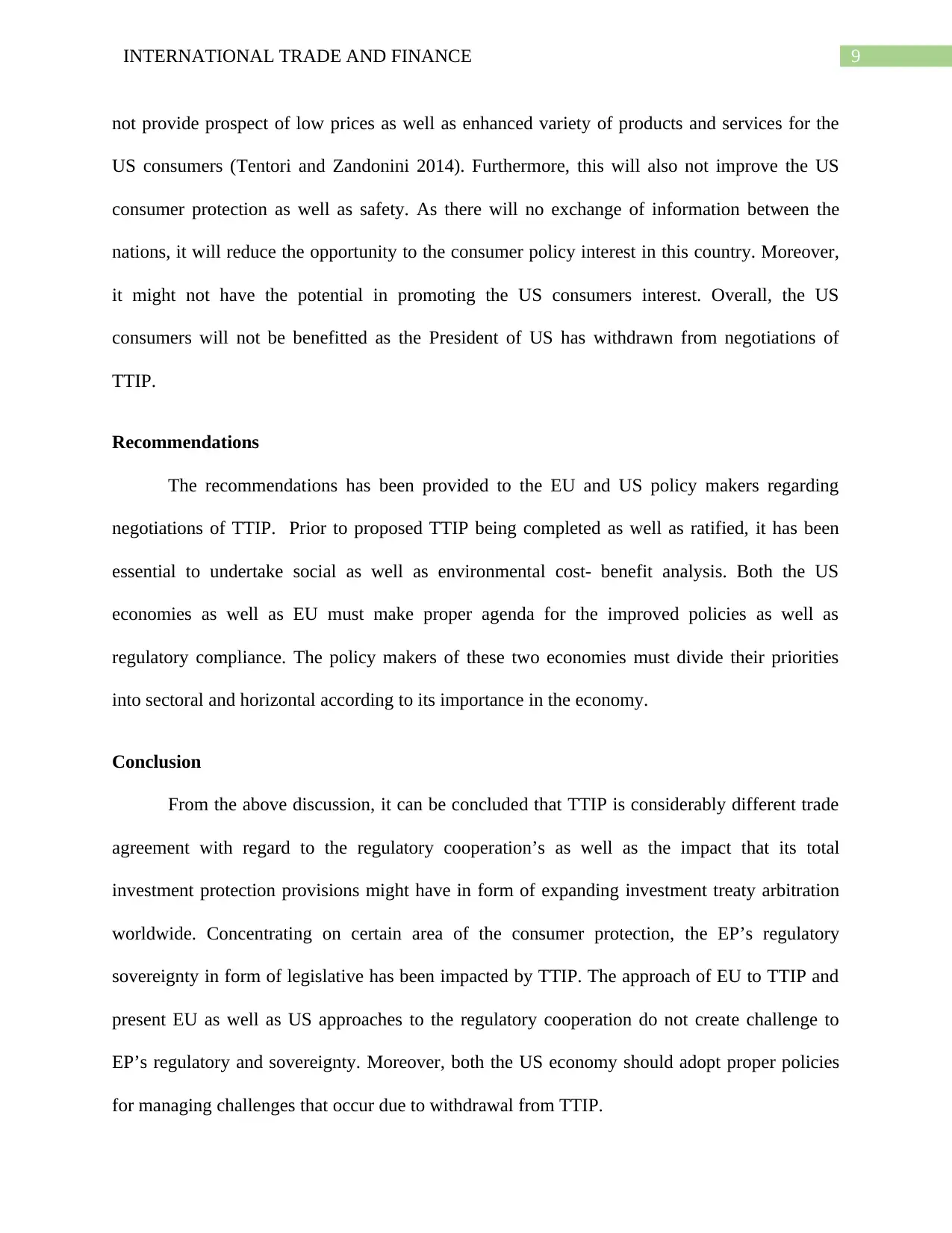
9INTERNATIONAL TRADE AND FINANCE
not provide prospect of low prices as well as enhanced variety of products and services for the
US consumers (Tentori and Zandonini 2014). Furthermore, this will also not improve the US
consumer protection as well as safety. As there will no exchange of information between the
nations, it will reduce the opportunity to the consumer policy interest in this country. Moreover,
it might not have the potential in promoting the US consumers interest. Overall, the US
consumers will not be benefitted as the President of US has withdrawn from negotiations of
TTIP.
Recommendations
The recommendations has been provided to the EU and US policy makers regarding
negotiations of TTIP. Prior to proposed TTIP being completed as well as ratified, it has been
essential to undertake social as well as environmental cost- benefit analysis. Both the US
economies as well as EU must make proper agenda for the improved policies as well as
regulatory compliance. The policy makers of these two economies must divide their priorities
into sectoral and horizontal according to its importance in the economy.
Conclusion
From the above discussion, it can be concluded that TTIP is considerably different trade
agreement with regard to the regulatory cooperation’s as well as the impact that its total
investment protection provisions might have in form of expanding investment treaty arbitration
worldwide. Concentrating on certain area of the consumer protection, the EP’s regulatory
sovereignty in form of legislative has been impacted by TTIP. The approach of EU to TTIP and
present EU as well as US approaches to the regulatory cooperation do not create challenge to
EP’s regulatory and sovereignty. Moreover, both the US economy should adopt proper policies
for managing challenges that occur due to withdrawal from TTIP.
not provide prospect of low prices as well as enhanced variety of products and services for the
US consumers (Tentori and Zandonini 2014). Furthermore, this will also not improve the US
consumer protection as well as safety. As there will no exchange of information between the
nations, it will reduce the opportunity to the consumer policy interest in this country. Moreover,
it might not have the potential in promoting the US consumers interest. Overall, the US
consumers will not be benefitted as the President of US has withdrawn from negotiations of
TTIP.
Recommendations
The recommendations has been provided to the EU and US policy makers regarding
negotiations of TTIP. Prior to proposed TTIP being completed as well as ratified, it has been
essential to undertake social as well as environmental cost- benefit analysis. Both the US
economies as well as EU must make proper agenda for the improved policies as well as
regulatory compliance. The policy makers of these two economies must divide their priorities
into sectoral and horizontal according to its importance in the economy.
Conclusion
From the above discussion, it can be concluded that TTIP is considerably different trade
agreement with regard to the regulatory cooperation’s as well as the impact that its total
investment protection provisions might have in form of expanding investment treaty arbitration
worldwide. Concentrating on certain area of the consumer protection, the EP’s regulatory
sovereignty in form of legislative has been impacted by TTIP. The approach of EU to TTIP and
present EU as well as US approaches to the regulatory cooperation do not create challenge to
EP’s regulatory and sovereignty. Moreover, both the US economy should adopt proper policies
for managing challenges that occur due to withdrawal from TTIP.
Paraphrase This Document
Need a fresh take? Get an instant paraphrase of this document with our AI Paraphraser
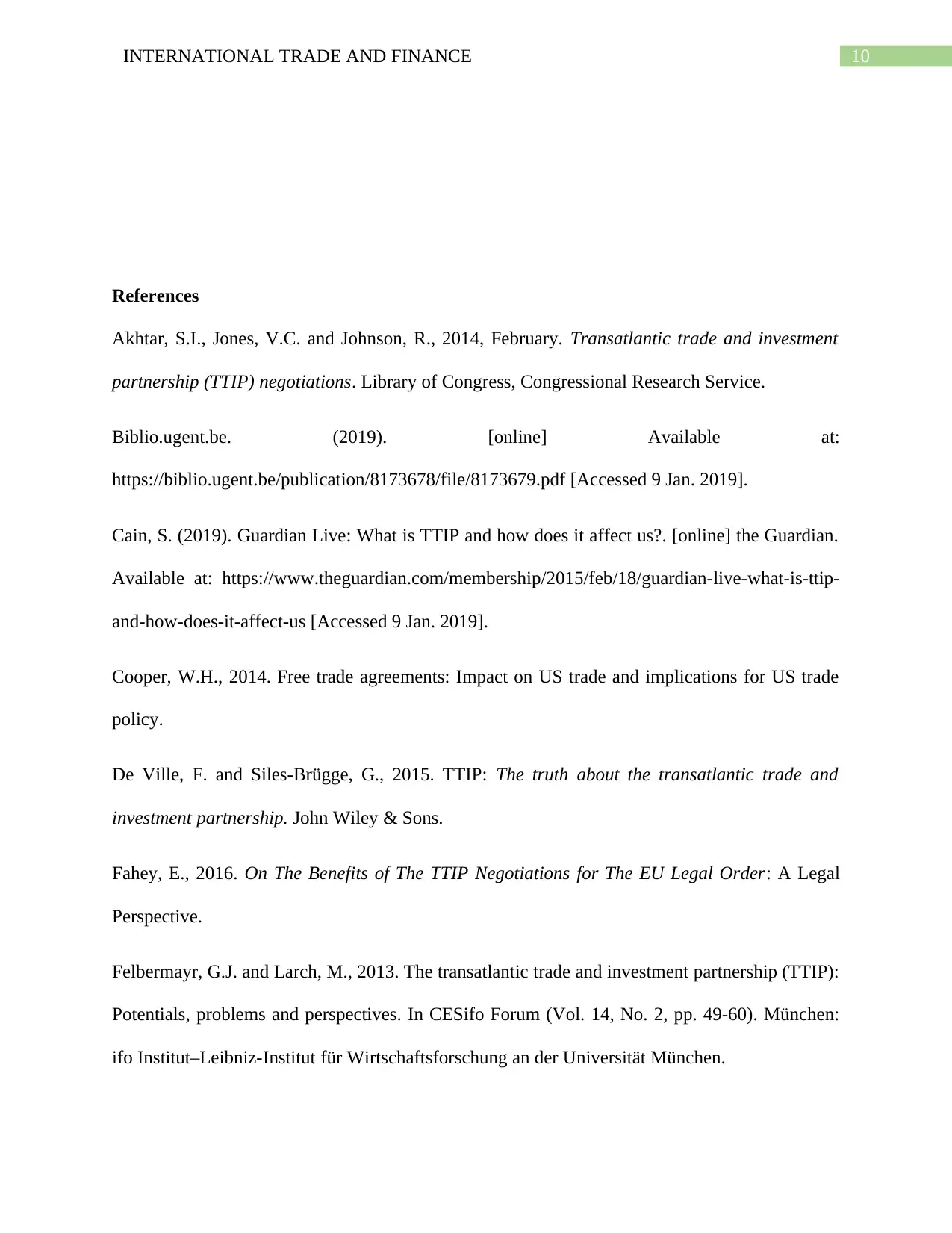
10INTERNATIONAL TRADE AND FINANCE
References
Akhtar, S.I., Jones, V.C. and Johnson, R., 2014, February. Transatlantic trade and investment
partnership (TTIP) negotiations. Library of Congress, Congressional Research Service.
Biblio.ugent.be. (2019). [online] Available at:
https://biblio.ugent.be/publication/8173678/file/8173679.pdf [Accessed 9 Jan. 2019].
Cain, S. (2019). Guardian Live: What is TTIP and how does it affect us?. [online] the Guardian.
Available at: https://www.theguardian.com/membership/2015/feb/18/guardian-live-what-is-ttip-
and-how-does-it-affect-us [Accessed 9 Jan. 2019].
Cooper, W.H., 2014. Free trade agreements: Impact on US trade and implications for US trade
policy.
De Ville, F. and Siles-Brügge, G., 2015. TTIP: The truth about the transatlantic trade and
investment partnership. John Wiley & Sons.
Fahey, E., 2016. On The Benefits of The TTIP Negotiations for The EU Legal Order: A Legal
Perspective.
Felbermayr, G.J. and Larch, M., 2013. The transatlantic trade and investment partnership (TTIP):
Potentials, problems and perspectives. In CESifo Forum (Vol. 14, No. 2, pp. 49-60). München:
ifo Institut–Leibniz-Institut für Wirtschaftsforschung an der Universität München.
References
Akhtar, S.I., Jones, V.C. and Johnson, R., 2014, February. Transatlantic trade and investment
partnership (TTIP) negotiations. Library of Congress, Congressional Research Service.
Biblio.ugent.be. (2019). [online] Available at:
https://biblio.ugent.be/publication/8173678/file/8173679.pdf [Accessed 9 Jan. 2019].
Cain, S. (2019). Guardian Live: What is TTIP and how does it affect us?. [online] the Guardian.
Available at: https://www.theguardian.com/membership/2015/feb/18/guardian-live-what-is-ttip-
and-how-does-it-affect-us [Accessed 9 Jan. 2019].
Cooper, W.H., 2014. Free trade agreements: Impact on US trade and implications for US trade
policy.
De Ville, F. and Siles-Brügge, G., 2015. TTIP: The truth about the transatlantic trade and
investment partnership. John Wiley & Sons.
Fahey, E., 2016. On The Benefits of The TTIP Negotiations for The EU Legal Order: A Legal
Perspective.
Felbermayr, G.J. and Larch, M., 2013. The transatlantic trade and investment partnership (TTIP):
Potentials, problems and perspectives. In CESifo Forum (Vol. 14, No. 2, pp. 49-60). München:
ifo Institut–Leibniz-Institut für Wirtschaftsforschung an der Universität München.
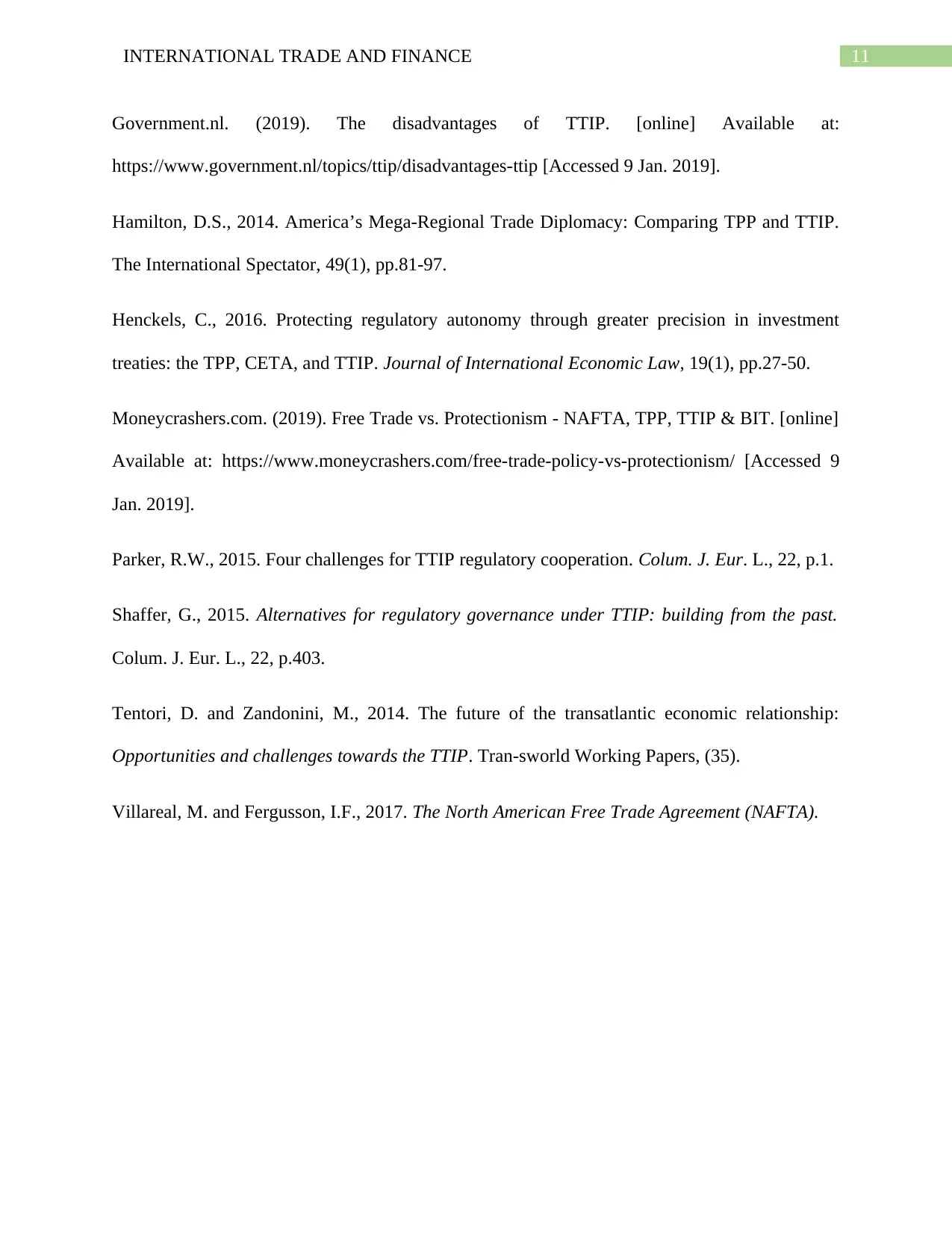
11INTERNATIONAL TRADE AND FINANCE
Government.nl. (2019). The disadvantages of TTIP. [online] Available at:
https://www.government.nl/topics/ttip/disadvantages-ttip [Accessed 9 Jan. 2019].
Hamilton, D.S., 2014. America’s Mega-Regional Trade Diplomacy: Comparing TPP and TTIP.
The International Spectator, 49(1), pp.81-97.
Henckels, C., 2016. Protecting regulatory autonomy through greater precision in investment
treaties: the TPP, CETA, and TTIP. Journal of International Economic Law, 19(1), pp.27-50.
Moneycrashers.com. (2019). Free Trade vs. Protectionism - NAFTA, TPP, TTIP & BIT. [online]
Available at: https://www.moneycrashers.com/free-trade-policy-vs-protectionism/ [Accessed 9
Jan. 2019].
Parker, R.W., 2015. Four challenges for TTIP regulatory cooperation. Colum. J. Eur. L., 22, p.1.
Shaffer, G., 2015. Alternatives for regulatory governance under TTIP: building from the past.
Colum. J. Eur. L., 22, p.403.
Tentori, D. and Zandonini, M., 2014. The future of the transatlantic economic relationship:
Opportunities and challenges towards the TTIP. Tran-sworld Working Papers, (35).
Villareal, M. and Fergusson, I.F., 2017. The North American Free Trade Agreement (NAFTA).
Government.nl. (2019). The disadvantages of TTIP. [online] Available at:
https://www.government.nl/topics/ttip/disadvantages-ttip [Accessed 9 Jan. 2019].
Hamilton, D.S., 2014. America’s Mega-Regional Trade Diplomacy: Comparing TPP and TTIP.
The International Spectator, 49(1), pp.81-97.
Henckels, C., 2016. Protecting regulatory autonomy through greater precision in investment
treaties: the TPP, CETA, and TTIP. Journal of International Economic Law, 19(1), pp.27-50.
Moneycrashers.com. (2019). Free Trade vs. Protectionism - NAFTA, TPP, TTIP & BIT. [online]
Available at: https://www.moneycrashers.com/free-trade-policy-vs-protectionism/ [Accessed 9
Jan. 2019].
Parker, R.W., 2015. Four challenges for TTIP regulatory cooperation. Colum. J. Eur. L., 22, p.1.
Shaffer, G., 2015. Alternatives for regulatory governance under TTIP: building from the past.
Colum. J. Eur. L., 22, p.403.
Tentori, D. and Zandonini, M., 2014. The future of the transatlantic economic relationship:
Opportunities and challenges towards the TTIP. Tran-sworld Working Papers, (35).
Villareal, M. and Fergusson, I.F., 2017. The North American Free Trade Agreement (NAFTA).
⊘ This is a preview!⊘
Do you want full access?
Subscribe today to unlock all pages.

Trusted by 1+ million students worldwide
1 out of 12
Related Documents
Your All-in-One AI-Powered Toolkit for Academic Success.
+13062052269
info@desklib.com
Available 24*7 on WhatsApp / Email
![[object Object]](/_next/static/media/star-bottom.7253800d.svg)
Unlock your academic potential
© 2024 | Zucol Services PVT LTD | All rights reserved.




